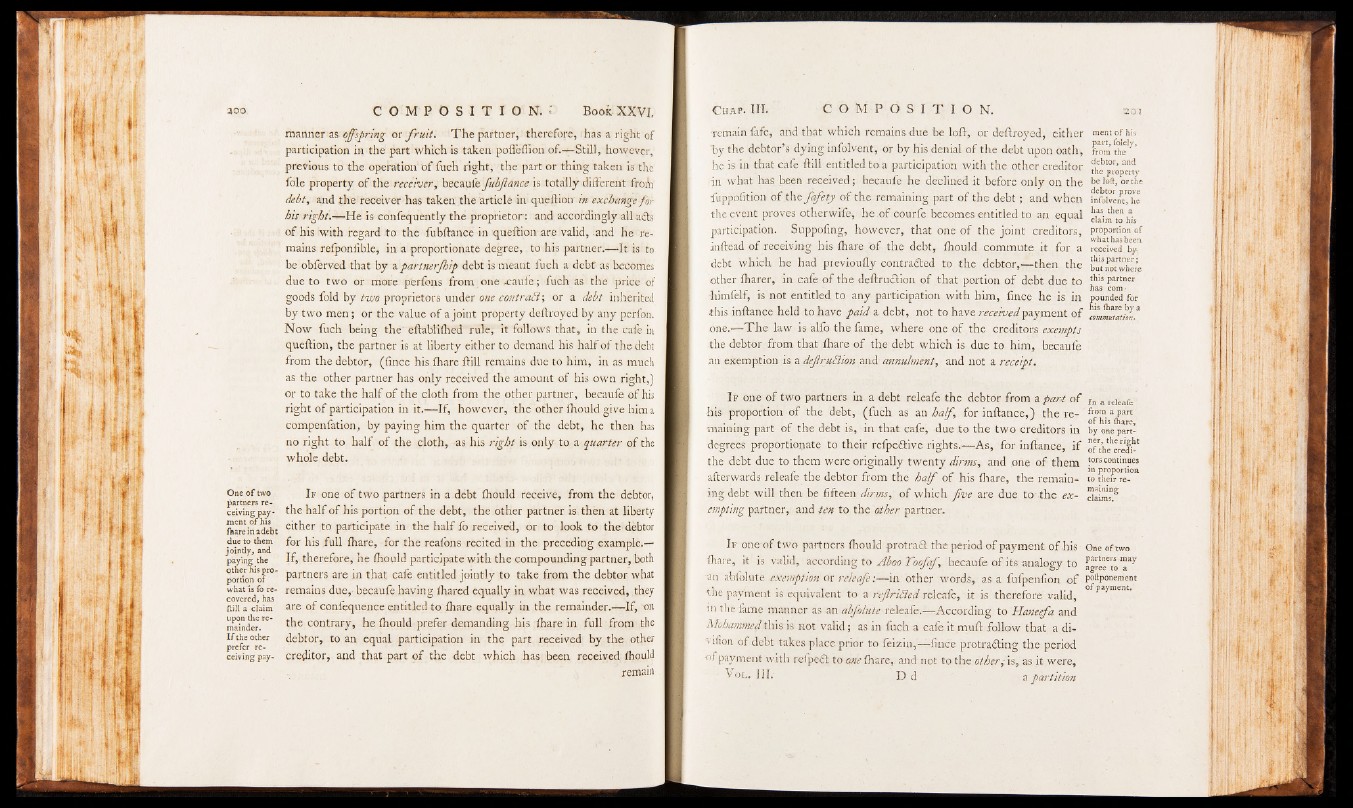
One o f two
partners receiving
payment
o f his
lhare in adebt
due to them
jointly, and
paying the
other his proportion
of
what is fo recovered,
has
Hill a claim
upon the remainder.
I f the other
prefer receiving
paymanner
as offspring or fru it. T h e partner, therefore, has a right of
participation in the part which is taken pofifeflion of.— Still, however,
previous to the operation' o f fuch right, the part or thing taken is the
foie property of the receiver, becaufe fubfance is totally different froAr
debt, and the receiver has taken the article in queftion in exchange for
his right.— He is confequently the proprietor: and accordingly all a£ls
of his with regard to the fubftance in queftion are valid, .and he remains
relponfible, in a proportionate degree, to his partner.— It is1 to
be obferved that by a parlnerfhip debt is meant fuch a debt as becomes
due to two or more perfbns from one -caule; fuch as the price of
goods fold by two proprietors under one contrast; or a debt inherited
by two men; or the value of a joint property deftroyed by any perfon.
Now fuch being the' eftabliflied rule,' it follows that, in the cafe in
queftion, the partner is at liberty either to demand his half of the debt
from the debtor, (fince his lhare ftill remains due to him, in as much
as the other partner has only received the amount of his own right,)
or to take the half of the cloth from the other partner, becaufe of his
right of participation in it.— If, however, the other lhould give him a
compenfation, by paying him the quarter of the debt, he then has
no right to half of the cloth, as his right is only to a quarter of the
whole debt.
If one of two partners in a debt lhould receive, from the debtor,
the half of his portion of the debt, the other partner is then at liberty
either to participate in the half lb received, or to look to the debtor
for his full lhare, for the realons recited in the preceding example.—
If, therefore, he lhould participate with the compounding partner, both
partners are in that cafe entitled jointly to take from the debtor what
remains due, becaufe having lhared equally in what was received, they
are of confequence entitled to lhare equally in the remainder.—If, 'On
the contrary, he lhould prefer demanding his lhare in full from the
debtor, to an equal participation in the part received by the other
creditor, and that part of the debt which has; been received lhould
remain
remain fafe, and that which remains due be loft, or deftroyed, either
by the debtor’ s dying infolvent, or by his denial of the debt upon oath,
he is in that cafe ftill entitled to a participation with the other creditor
in what has been received; becaufe he declined it before only on the
fuppofition of the fafety of the remaining part of the debt; and when
the event proves otherwife, he,of courfe becomes entitled to an equal
participation. Suppofing, however, that one of the joint creditors,
inftead of receiving his lhare of the debt, lhould commute it for a
debt which he had previoully contradted to the debtor,— then the
other lharer, in cafe of the deftrudtion of that portion of debt due to
himfelf, is not entitled to any participation with him, fince he is in
this inftance held to have paid a debt, not to have received payment of
one.— T h e law' is alfo the fame, where one of the creditors exempts
the debtor from that lhare of the debt which is due to him, becaufe
ian exemption is a defiruStion and annulment, and not a receipt.
If one of two partners in a debt releafe the debtor from a part of
his proportion of the debt, (fuch as an h a lf for inftance,) the remaining
part of the debt is, in that cafe, due to the two creditors in
degrees proportionate to their refpedtive rights.—As, for inftance, if
the debt due to them were originally twenty dirms, and one of them
afterwards releafe the debtor from the h a lf of his lhare, the remaining
debt will then be fifteen dirms, of which five are due to- the exempting
partner, and ten to the other partner.
If oneof two partners lhould protradi the period of payment of his
lhare, it is valid, according to Aboo Yoofcf,. becaufe of its analogy to
■an abfolute exemption or releafe:-—in other words, as a firljaenfion of
the payment is equivalent to a refiriBed releafe, it is therefore valid,
in the fame manner as an abfolute releafe.—According to Haneefa and
Mohammed this is not valid; as in fuch a cafe it muft follow that a. di-
vifion of debt takes place prior to feizin,—fince protradting the period
of payment with refpedt to' one lhare,. and not to the other fin, as it were,
V o l . III. D d a partition
raentof his
part, folely,
from the
debtor, and
the property
be loft, or the
debtor prove
infolvent, he
has then a
claim to his
proportion of
what has been
received ,bys
this partner;
but not where
this partner
has compounded
for
his lhare by a
commutation.
In a releafe
from a part
o f his lhare,
by one partner,
the right
o f the creditors
continues
in proportion
to their remaining
claims.
One o f two
partners .may
agree to a
poftponement
o f payment.